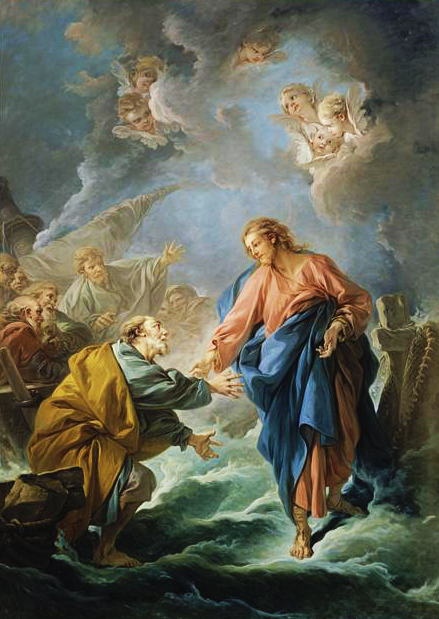
Supernatural
Supernatural refers to phenomena or entities that are beyond the laws of nature.[1] The term is derived from Medieval Latin supernaturalis, from Latin super- (above, beyond, or outside of) + natura (nature).[1] Although the corollary term "nature" has had multiple meanings since the ancient world, the term "supernatural" emerged in the Middle Ages[2] and did not exist in the ancient world.[3]
This article is about unexplained or non-natural forces and phenomena. For the television series, see Supernatural (American TV series). For other uses, see Supernatural (disambiguation).The supernatural is featured in folklore and religious contexts,[4] but can also feature as an explanation in more secular contexts, as in the cases of superstitions or belief in the paranormal.[5] The term is attributed to non-physical entities, such as angels, demons, gods, and spirits. It also includes claimed abilities embodied in or provided by such beings, including magic, telekinesis, levitation, precognition, and extrasensory perception.
The metaphysical considerations of the existence of the supernatural can be difficult to approach as an exercise in philosophy or theology because any dependencies on its antithesis, the natural, will ultimately have to be inverted or rejected. One complicating factor is that there is disagreement about the definition of "natural" and the limits of naturalism. Concepts in the supernatural domain are closely related to concepts in religious spirituality and occultism or spiritualism.
Nomological possibility is possibility under the actual laws of nature. Most philosophers since David Hume have held that the laws of nature are metaphysically contingent—that there could have been different natural laws than the ones that actually obtain. If so, then it would not be logically or metaphysically impossible, for example, for you to travel to Alpha Centauri in one day; it would just have to be the case that you could travel faster than the speed of light. But of course there is an important sense in which this is not nomologically possible; given that the laws of nature are what they are. In the philosophy of natural science, impossibility assertions come to be widely accepted as overwhelmingly probable rather than considered proved to the point of being unchallengeable. The basis for this strong acceptance is a combination of extensive evidence of something not occurring, combined with an underlying scientific theory, very successful in making predictions, whose assumptions lead logically to the conclusion that something is impossible. While an impossibility assertion in natural science can never be absolutely proved, it could be refuted by the observation of a single counterexample. Such a counterexample would require that the assumptions underlying the theory that implied the impossibility be re-examined. Some philosophers, such as Sydney Shoemaker, have argued that the laws of nature are in fact necessary, not contingent; if so, then nomological possibility is equivalent to metaphysical possibility.[9][10][11]
The term supernatural is often used interchangeably with paranormal or preternatural—the latter typically limited to an adjective for describing abilities which appear to exceed what is possible within the boundaries of the laws of physics.[12] Epistemologically, the relationship between the supernatural and the natural is indistinct in terms of natural phenomena that, ex hypothesi, violate the laws of nature, in so far as such laws are realistically accountable.
Views on the "supernatural" vary, for example it may be seen as:
Cross cultural studies[edit]
Anthropological studies across cultures indicate that people do not hold or use natural and supernatural explanations in a mutually exclusive or dichotomous fashion. Instead, the reconciliation of natural and supernatural explanations is normal and pervasive across cultures.[16] Cross cultural studies indicate that there is coexistence of natural and supernatural explanations in both adults and children for explaining numerous things about the world, such as illness, death, and origins.[17][18] Context and cultural input play a large role in determining when and how individuals incorporate natural and supernatural explanations.[19] The coexistence of natural and supernatural explanations in individuals may be the outcomes two distinct cognitive domains: one concerned with the physical-mechanical relations and another with social relations.[20] Studies on indigenous groups have allowed for insights on how such coexistence of explanations may function.[21]